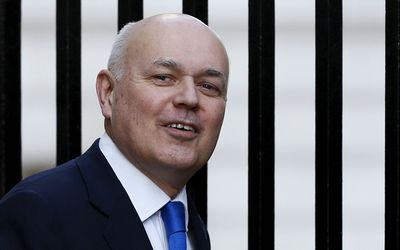UK pensions secretary quits in protest to disability-benefits cuts
by Agency Staff,
2016-03-19 12:46:30.0
IAIN Duncan Smith, the former Conservative Party leader, has resigned as UK work and pensions secretary in protest at planned cuts to welfare payments for the disabled, issuing a direct attack on the man behind them, Finance Minister George Osborne.
In one of the most dramatic resignations since the fall of Margaret Thatcher, Mr Duncan Smith sent Prime Minister David Cameron a two-page letter on Friday that attacked a series of decisions to cut welfare
In Mr Osborne’s budget statement on Wednesday, the chancellor reduced money allocated to help disabled people while cutting taxes for the well paid.
While the disability-benefits cuts "are defensible in narrow terms, given the continuing deficit, they are not defensible in the way they were placed within a budget that benefits higher-earning taxpayers," Mr Duncan Smith wrote. "I am unable to watch passively whilst certain policies are enacted in order to meet the fiscal self-imposed restraints that I believe are more and more perceived as distinctly political."
Mr Cameron responded with his own letter, saying he was "puzzled and disappointed" at Mr Duncan Smith’s decision to resign, and that those policies were being put on hold. "As a government, we have done a huge amount to get people into work, reduce unemployment and promote social justice," Mr Cameron wrote. "We all agreed that the increased resources being spent on disabled people should be properly managed and focused on those who need it most.
"That is why we collectively agreed — you, No. 10 and the Treasury — proposals which you and your department then announced a week ago. Today we agreed not to proceed with the policies in their current form and instead to work together to get these policies right over the coming months."
Reductions in the payments — welfare benefits to disabled people with care and mobility needs — would save the Treasury about £1.3bn in the 2020-21 tax year and a total of £4.4bn over five years, according to budget documents.
Mr Duncan Smith, 61, had widely been expected to leave the government following the June 23 referendum on membership of the European Union, in which he’s campaigning to leave the bloc, taking the opposite side from Cameron and Osborne. His departure now, accusing the pair of making welfare cuts for political reasons, is a deep wound to both men. Opposition Labour Party leader Jeremy Corbyn said the resignation "reveals a government in disarray".
‘Social justice’
Mr Duncan Smith has spent six years overseeing unpopular changes to benefits and has often been the subject of attacks from those who opposed the cuts. Having devoted his time since being ousted as party leader in 2003 to understanding the welfare system, the outgoing minister accused Mr Cameron and Mr Osborne in his letter on Friday of prioritising winning the support of older voters over "social justice."
"You are aware that I believe the cuts would have been even fairer to younger families and people of working age if we had been willing to reduce some of the benefits given to better-off pensioners, but I have attempted to work within the constraints that you and the Chancellor set," he wrote.
In both 2010 and 2015, Mr Cameron made pre-election promises to protect payments to retirees, who are the sector of the population most likely to vote.
Earlier on Friday, the government pledged to push ahead with the proposed cuts. While the budget initially attracted broad support from rank-and-file Tory lawmakers on Wednesday, concerns later began to be expressed about the changes to disability support.
Mr Corbyn said earlier on Friday he’d seek to force a vote in Parliament on the issue, hoping to attract enough dissident Conservatives to defeat the government and block the proposal.
Mr Osborne is also facing another rebellion over plans to increase sales tax on solar-energy equipment in line with an EU ruling.
"The budget has exposed George Osborne’s record of profound unfairness and economic failure," Mr Corbyn said in a statement. "The chancellor has failed the British people. He should follow the honorable course taken by Iain Duncan Smith and resign."
Bloomberg

Iain Duncan Smith. Picture: REUTERS
IAIN Duncan Smith, the former Conservative Party leader, has resigned as UK work and pensions secretary in protest at planned cuts to welfare payments for the disabled, issuing a direct attack on the man behind them, Finance Minister George Osborne.
In one of the most dramatic resignations since the fall of Margaret Thatcher, Mr Duncan Smith sent Prime Minister David Cameron a two-page letter on Friday that attacked a series of decisions to cut welfare
In Mr Osborne’s budget statement on Wednesday, the chancellor reduced money allocated to help disabled people while cutting taxes for the well paid.
While the disability-benefits cuts "are defensible in narrow terms, given the continuing deficit, they are not defensible in the way they were placed within a budget that benefits higher-earning taxpayers," Mr Duncan Smith wrote. "I am unable to watch passively whilst certain policies are enacted in order to meet the fiscal self-imposed restraints that I believe are more and more perceived as distinctly political."
Mr Cameron responded with his own letter, saying he was "puzzled and disappointed" at Mr Duncan Smith’s decision to resign, and that those policies were being put on hold. "As a government, we have done a huge amount to get people into work, reduce unemployment and promote social justice," Mr Cameron wrote. "We all agreed that the increased resources being spent on disabled people should be properly managed and focused on those who need it most.
"That is why we collectively agreed — you, No. 10 and the Treasury — proposals which you and your department then announced a week ago. Today we agreed not to proceed with the policies in their current form and instead to work together to get these policies right over the coming months."
Reductions in the payments — welfare benefits to disabled people with care and mobility needs — would save the Treasury about £1.3bn in the 2020-21 tax year and a total of £4.4bn over five years, according to budget documents.
Mr Duncan Smith, 61, had widely been expected to leave the government following the June 23 referendum on membership of the European Union, in which he’s campaigning to leave the bloc, taking the opposite side from Cameron and Osborne. His departure now, accusing the pair of making welfare cuts for political reasons, is a deep wound to both men. Opposition Labour Party leader Jeremy Corbyn said the resignation "reveals a government in disarray".
‘Social justice’
Mr Duncan Smith has spent six years overseeing unpopular changes to benefits and has often been the subject of attacks from those who opposed the cuts. Having devoted his time since being ousted as party leader in 2003 to understanding the welfare system, the outgoing minister accused Mr Cameron and Mr Osborne in his letter on Friday of prioritising winning the support of older voters over "social justice."
"You are aware that I believe the cuts would have been even fairer to younger families and people of working age if we had been willing to reduce some of the benefits given to better-off pensioners, but I have attempted to work within the constraints that you and the Chancellor set," he wrote.
In both 2010 and 2015, Mr Cameron made pre-election promises to protect payments to retirees, who are the sector of the population most likely to vote.
Earlier on Friday, the government pledged to push ahead with the proposed cuts. While the budget initially attracted broad support from rank-and-file Tory lawmakers on Wednesday, concerns later began to be expressed about the changes to disability support.
Mr Corbyn said earlier on Friday he’d seek to force a vote in Parliament on the issue, hoping to attract enough dissident Conservatives to defeat the government and block the proposal.
Mr Osborne is also facing another rebellion over plans to increase sales tax on solar-energy equipment in line with an EU ruling.
"The budget has exposed George Osborne’s record of profound unfairness and economic failure," Mr Corbyn said in a statement. "The chancellor has failed the British people. He should follow the honorable course taken by Iain Duncan Smith and resign."
Bloomberg





















Change: -0.80%
Change: -1.03%
Change: -0.24%
Change: -1.13%
Change: -1.10%
Data supplied by Profile Data
Change: 0.13%
Change: -0.29%
Change: -0.80%
Change: 0.00%
Change: 0.03%
Data supplied by Profile Data
Change: 0.02%
Change: -0.99%
Change: -0.03%
Change: -0.15%
Change: 0.81%
Data supplied by Profile Data
Change: 0.33%
Change: 1.22%
Change: 0.06%
Change: 0.50%
Change: 1.04%
Data supplied by Profile Data